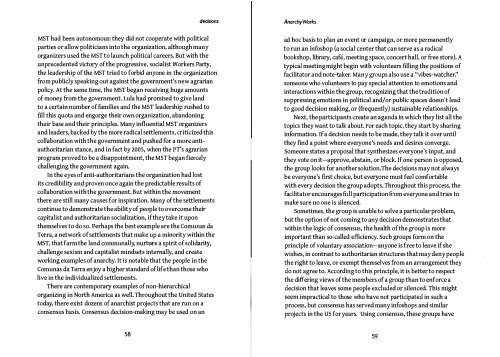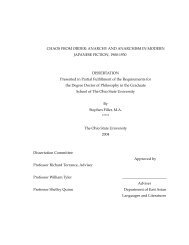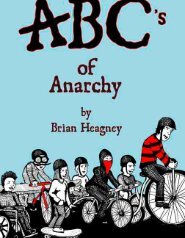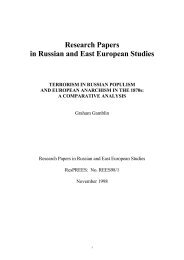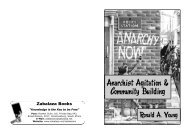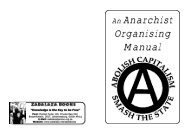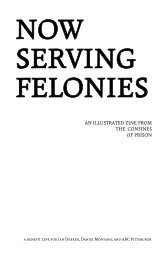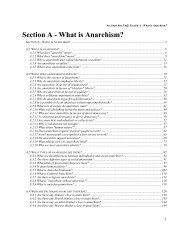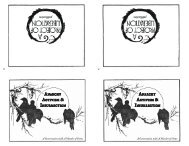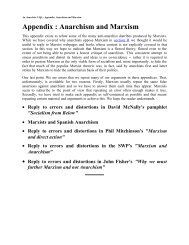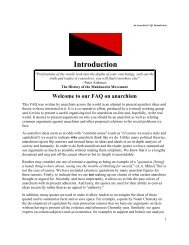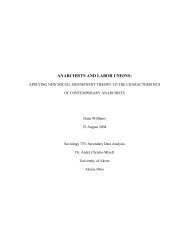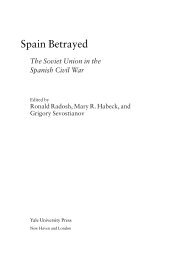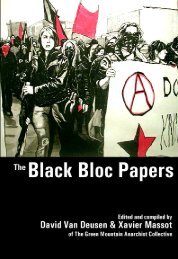Anarchy Works.pdf - Infoshop.org
Anarchy Works.pdf - Infoshop.org
Anarchy Works.pdf - Infoshop.org
Create successful ePaper yourself
Turn your PDF publications into a flip-book with our unique Google optimized e-Paper software.
decisions<br />
<strong>Anarchy</strong> <strong>Works</strong><br />
MST had been autonomous: they did not cooperate with political<br />
parties or allow politicians into the <strong>org</strong>anization, although many<br />
<strong>org</strong>anizers used the MST to launch political careers. But with the<br />
unprecedented victory of the progressive, socialist Workers Party,<br />
the leadership of the MST tried to forbid anyone in the <strong>org</strong>anization<br />
from publicly speaking out against the government's new agrarian<br />
policy. At the same time, the MST began receiving huge amounts<br />
of money from the government. Lula had promised to give land<br />
to a certain number of families and the MST leadership rushed to<br />
fill this quota and eng<strong>org</strong>e their own <strong>org</strong>anization, abandoning<br />
their base and their principles. Many influential MST <strong>org</strong>anizers<br />
and leaders, backed by the more radical settlements, criticized this<br />
collaboration with the government and pushed for a more antiauthoritarian<br />
stance, and in fact by 2005, when the PT's agrarian<br />
program proved to be a disappointment, the MST began fiercely<br />
challenging the government again.<br />
In the eyes of anti-authoritarians the <strong>org</strong>anization had lost<br />
its credibility and proven once again the predictable results of<br />
collaboration with the government. But within the movement<br />
there are still many causes for inspiration. Many of the settlements<br />
continue to demonstrate the ability of people to overcome their<br />
capitalist and authoritarian socialization, if they take it upon<br />
themselves to do so. Perhaps the best example are the Comunas da<br />
Terra, a network of settlements that make up a minority within the<br />
MST, that farm the land communally, nurture a spirit of solidarity,<br />
challenge sexism and capitalist mindsets internally, and create<br />
working examples of anarchy. It is notable that the people in the<br />
Comunas da Terra enjoy a higher standard of life than those who<br />
live in the individualized settlements.<br />
There are contemporary examples of non-hierarchical<br />
<strong>org</strong>anizing in North America as well. Throughout the United States<br />
today, there exist dozens of anarchist projects that are run on a<br />
consensus basis. Consensus decision-making may be used on an<br />
ad hoc basis to plan an event or campaign, or more permanently<br />
to run an infoshop (a social center that can serve as a radical<br />
bookshop, library, cafe, meeting space, concert hall, or free store). A<br />
typical meeting might begin with volunteers filling the positions of<br />
facilitator and note-taker. Many groups also use a "vibes-watcher,"<br />
someone who volunteers to pay special attention to emotions and<br />
interactions within the group, recognizing that the tradition of<br />
suppressing emotions in political and/or public spaces doesn't lead<br />
to good decision making, or (frequently) sustainable relationships.<br />
Next, the participants create an agenda in which they list all the<br />
topics they want to talk about. For each topic, they start by sharing<br />
information. If a decision needs to be made, they talk it over until<br />
they find a point where everyone's needs and desires converge.<br />
Someone states a proposal that synthesizes everyone's input, and<br />
they vote on it-approve, abstain, or block. If one person is opposed,<br />
the group looks for another solution.The decisions may not always<br />
be everyone's first choice, but everyone must feel comfortable<br />
with every decision the group adopts. Throughout this process, the<br />
facilitator encourages full participation from everyone and tries to<br />
make sure no one is silenced.<br />
Sometimes, the group is unable to solve a particular problem,<br />
but the option of not coming to any decision demonstrates that<br />
within the logic of consensus, the health of the group is more<br />
important than so-called efficiency. Such groups form on the<br />
principle of voluntary association-anyone is free to leave if she<br />
wishes, in contrast to authoritarian structures that may deny people<br />
the right to leave, or exempt themselves from an arrangement they<br />
do not agree to. According to this principle, it is better to respect<br />
the differing views of the members of a group than to enforce a<br />
decision that leaves some people excluded or silenced. This might<br />
seem impractical to those who have not participated in such a<br />
process, but consensus has served many infoshops and similar<br />
projects in the us for years. Using consensus, these groups have<br />
58<br />
59


